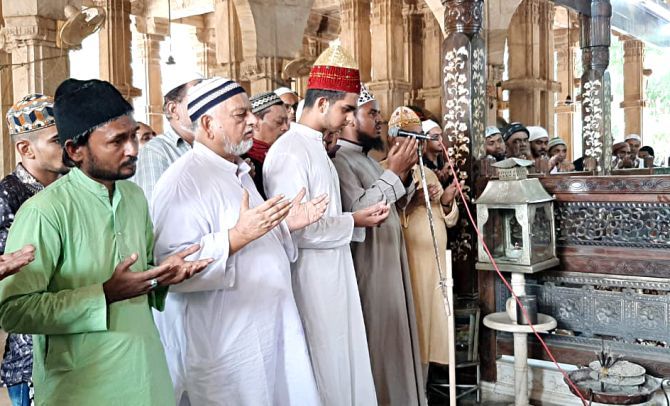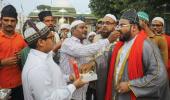With days to go for the August 5 'bhoomi pujan' ceremony of the Ram temple in Ayodhya, the mosques adjacent to the Ram Janmabhoomi premises are spreading the message of communal harmony.

"It is the greatness of Ayodhya that the mosques surrounding the Ram temple are giving a strong message of communal harmony to the rest of the world," Haji Asad Ahmad, the corporator of the Ram Kot ward, told PTI.
The Ram Janmabhoomi premises is situated in Ahmad's ward.
"Muslims take out the 'juloos' of Barawafaat that goes through the periphery of Ram Janmabhoomi. All religious functions and rituals of Muslims are respected by their fellow citizens," the corporator said.
There are eight mosques and two mausoleums located close to the 70-acre Ram Janmabhoomi premises mandated by the Supreme Court for a temple of Lord Ram.
Azaan and namaaz are offered in the mosques and the annual 'Urs' is held at the mausoleums without any objection from the local Hindus.
The mosques located near the Ram Janmabhoomi premises are Masjid Dorahikuan, Masjid Mali Mandir ke Bagal, Masjid Kaziyana Achchan ke Bagal, Masjid Imambara, Masjid Riyaz ke Bagal, Masjid Badar Paanjitola, Masjid Madaar Shah and Masjid Tehribazar Jogiyon ki.
The two mausoleums are Khanqaahe Muzaffariya and Imambara.
The priests of various temples here said Ayodhya is a town where Hindus and Muslims have always lived together peacefully.
On the presence of mosques near the Ram Janmabhoomi premises, the chief priest of the temple, Acharya Satyendra Das, said, "We had a dispute only with the structure that was connected to the name of (Mughal emperor) Babur.
"We have never had any issue with the other mosques and mausoleums in Ayodhya. This is a town where Hindus and Muslims live in peace."
"Muslims offer namaaz, we perform our puja. The mosques adjacent to the Ram Janmabhoomi premises will strengthen Ayodhya's communal harmony and peace will prevail," he added.
Both Hindus and Muslims have accepted the Supreme Court verdict over Ram Janmabhoomi, Das said, adding, "We have no dispute with each other."
Sayyad Akhlaq Ahmad Latifi, the 'sajjada nasheen' and 'pir' of the 500-year-old Khanqaahe Muzaffariya mausoleum, said Muslims in Ayodhya are performing all religious practices freely.
"We offer prayers five times a day in the mosque at Khanqaah and hold the yearly 'Urs'," he added.
"What a scene would it be -- a grand Ram temple surrounded by small mosques and mausoleums and everyone offering prayers according to their beliefs.
"That will be representative of the true culture of India," Mahant Yugal Kishore Sharan Shastri, the chief priest of the Sarayu Kunj temple adjacent to the Ram Janmabhoomi premises, said.
On the presence of mosques and mausoleums near the Ram Janmabhoomi premises, Triloki Nath Pandey, the decree holder of the land as the 'first friend of Ram Lalla' as mandated by the Supreme Court, said, "We do not have any objection to either those mosques or any other mosques. We will not trigger a dispute regarding any structure, Ayodhya must live in peace and communal harmony."
Mahant Raju Das, the priest of the Hanumangarhi temple, said, "The presence of the mosques tells the story of Ayodhya's communal harmony. A Ram mandir will be built and there will be no objection to the mosques or religious practices of Muslims."
Image used only for representation.











 © 2025
© 2025